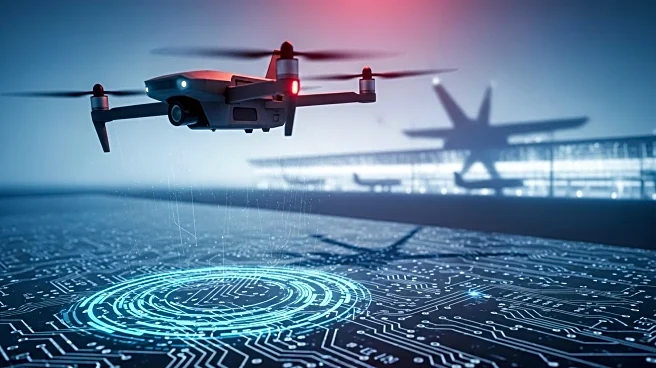What is the story about?
What's Happening?
A ransomware attack on Collins Aerospace, a U.S.-based aviation technology company, has led to significant disruptions at major European airports, including London Heathrow and Berlin Brandenburg. The attack, which began on September 19, 2025, resulted in the encryption of data on the company's servers, forcing airlines to switch to manual check-in procedures. This has caused flight cancellations and long delays, particularly at Heathrow, where passengers have been advised to arrive early due to extended waiting times. Brussels Airport also faced challenges, canceling 44 departing flights on Sunday despite requests to ground half of all outbound flights. The cyberattack has severely impacted airport operations, with manual check-in processes leading to long queues and delays.
Why It's Important?
The cyberattack on Collins Aerospace highlights vulnerabilities in aviation technology systems and underscores the potential for significant disruptions in air travel. The incident affects not only passengers but also the broader aviation industry, which relies heavily on technology for efficient operations. Airlines and airports face increased operational costs and logistical challenges as they revert to manual procedures. The attack raises concerns about cybersecurity in critical infrastructure sectors, prompting discussions on enhancing security measures to prevent future incidents. The economic impact is substantial, affecting travel plans, business operations, and potentially leading to financial losses for airlines and airports.
What's Next?
Airports and airlines are likely to continue facing operational challenges until the ransomware issue is resolved. Efforts to restore normal operations will depend on negotiations with the hackers and the ability to decrypt the affected data. The incident may lead to increased investment in cybersecurity measures within the aviation industry to prevent similar attacks. Regulatory bodies might also consider implementing stricter cybersecurity standards for companies involved in critical infrastructure. Stakeholders, including government agencies and industry leaders, are expected to collaborate on strategies to enhance resilience against cyber threats.
Beyond the Headlines
The cyberattack on Collins Aerospace could trigger broader discussions on the ethical implications of ransomware attacks and the responsibilities of companies in safeguarding sensitive data. It may also lead to debates on the legal frameworks governing cybersecurity and the role of international cooperation in addressing cybercrime. The incident highlights the interconnectedness of global travel systems and the potential ripple effects of disruptions in one region on international travel and commerce.















